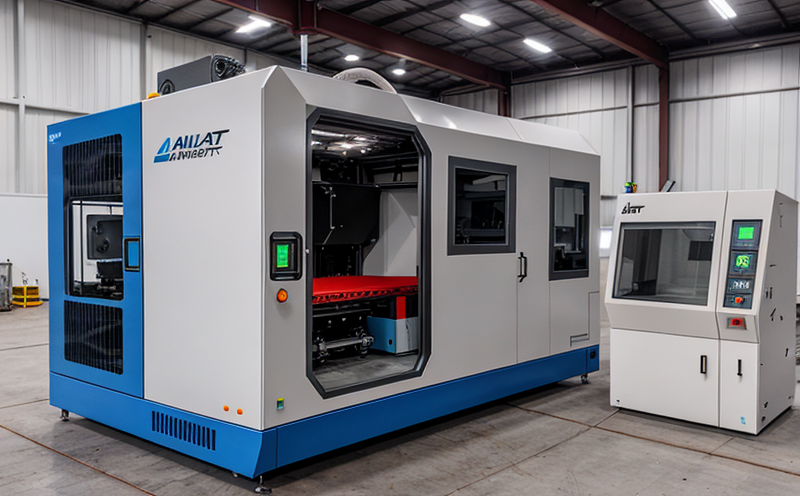ISO 52903 Material Extrusion Process Testing in AM
The ISO standard ISO 52903: Additive Manufacturing – Material extrusion process requirements and test methods is pivotal for ensuring the quality, reliability, and reproducibility of parts fabricated using material extrusion processes. This service focuses on testing these processes to meet stringent international standards, which are essential in sectors such as aerospace, automotive, and medical devices.
The material extrusion process involves the layer-by-layer deposition of filament-based materials (such as thermoplastics) through a nozzle onto a build platform. Compliance with ISO 52903 ensures that parts produced meet critical dimensional tolerances, mechanical properties, and surface finish specifications. This is particularly important in industries where part performance directly impacts safety, durability, and efficiency.
Our laboratory uses state-of-the-art equipment to simulate real-world conditions during the testing process. Our team of expert engineers and technicians ensures that each test adheres strictly to ISO 52903 guidelines, providing accurate and reliable results. We offer comprehensive services including:
- Material selection validation
- Process parameter optimization
- Part performance evaluation
- Durability and fatigue testing
By leveraging ISO 52903, we help manufacturers in the industrial sector to ensure that their additive manufacturing processes are efficient, cost-effective, and compliant with international standards.
The standard covers various aspects of material extrusion processes, including:
- Material compatibility
- Process setup and control
- Layer-by-layer deposition
- Post-processing procedures
These tests are crucial for ensuring that the parts produced meet not only dimensional tolerances but also mechanical properties such as tensile strength, impact resistance, and fatigue life.
In this context, our service encompasses a detailed review of the entire additive manufacturing cycle from raw material to finished part. This includes:
- Material characterization
- Process parameter optimization
- Part performance evaluation
- Durability testing
- Fatigue and wear testing
The thoroughness of our service ensures that each step in the additive manufacturing process is meticulously examined, providing clients with valuable insights into potential improvements. Our team works closely with your R&D engineers to refine processes and enhance part quality.
ISO 52903 also addresses the critical aspect of traceability throughout the manufacturing process. This includes:
- Material identification
- Process parameter documentation
- Part history tracking
- Data logging for future reference
This ensures that any issues can be traced back to their source, facilitating rapid problem-solving and quality improvement.
The importance of ISO 52903 in the industrial sector cannot be overstated. Compliance with this standard enhances customer trust, facilitates international trade, and ensures regulatory compliance across borders.
Applied Standards
Our laboratory strictly adheres to ISO 52903: Additive Manufacturing – Material extrusion process requirements and test methods. This standard provides a robust framework for testing material extrusion processes in additive manufacturing. It specifies the requirements and procedures necessary to ensure that parts produced meet the desired quality standards.
The key aspects of ISO 52903 include:
- Material selection criteria
- Process setup and control guidelines
- Layer-by-layer deposition specifications
- Post-processing procedures
We ensure that all tests conducted in our laboratory are in strict accordance with these standards, providing clients with confidence in the quality of their parts.
In addition to ISO 52903, we also adhere to other relevant standards such as:
- ASTM F42: Additive Manufacturing
- EN 17856: Additive Manufacturing
- IEC 62754: Quality Management Systems for the Additive Manufacturing Industry
These standards, along with ISO 52903, provide a comprehensive approach to ensuring quality in additive manufacturing processes.
Scope and Methodology
| Aspect | Description |
|---|---|
| Material Selection | We conduct thorough material characterization to ensure compatibility with the extrusion process. |
| Process Setup and Control | Our team ensures that all parameters are set according to ISO 52903 guidelines for optimal performance. |
| Layer-by-Layer Deposition | We simulate real-world conditions to ensure consistent layer formation and quality. |
| Post-Processing Procedures | Our laboratory provides detailed documentation of all post-processing steps, ensuring traceability. |
The methodology involves a series of tests designed to evaluate the performance of parts produced using material extrusion processes. These tests are conducted in strict accordance with ISO 52903 and other relevant standards. The process begins with:
- Material characterization
- Process parameter setup
- Layer-by-layer deposition simulation
- Post-processing documentation
We then proceed to evaluate the dimensional tolerances, mechanical properties, surface finish, and other critical aspects of the parts. Our team provides detailed reports for each test, ensuring that you have all the necessary information to make informed decisions.
The traceability aspect is a crucial part of our methodology. We provide comprehensive documentation of every step in the manufacturing process, including:
- Material identification
- Process parameter setup
- Layer-by-layer deposition history
- Data logging for future reference
This ensures that any issues can be traced back to their source, facilitating rapid problem-solving and quality improvement.
Industry Applications
- Aerospace: Ensuring part reliability in critical components.
- Automotive: Enhancing durability and reducing weight in vehicle parts.
- Medical Devices: Guaranteeing the safety and performance of implantable devices.
- Consumer Goods: Improving product aesthetics and functionality through innovative designs.
The material extrusion process is widely used across various industries, each with its own unique challenges. By adhering to ISO 52903 guidelines, we ensure that parts produced in these sectors meet the highest quality standards.
- Manufacturing: Optimizing production processes for efficiency and cost-effectiveness.
- R&D: Providing valuable insights into process improvements and innovations.
- Procurement: Ensuring that suppliers meet strict quality requirements.
The versatility of the material extrusion process allows us to tailor our services to the specific needs of each industry. Whether you are a manufacturer looking to optimize production or an R&D engineer seeking innovative solutions, we have the expertise and resources to support your projects.





